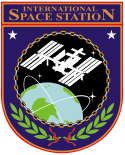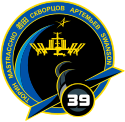Ekspedycja 39
| ||
 | ||
| Pojazd | ||
| Pojazd dowożący | Sojuz TMA-11M, Sojuz TMA-12M | |
| Załoga | ||
 Zdjęcie załogi, od lewej: Oleg Artiemjew, Steven Swanson, Aleksandr Skworcow, Michaił Tiurin, Koichi Wakata, Richard Mastracchio | ||
| Załoga | 6 | |
| Start | ||
| Miejsce startu | Kosmodrom Bajkonur, Kazachstan | |
| Początek misji | 11 marca 2014, 00:02:33 UTC rozpoczęcie Ekspedycji 39 | |
| Misja ISS | ||
| Lądowanie | ||
| Lądowanie | 13 maja 2014, 22:35:56 UTC zakończenie Ekspedycji 39 | |
| Czas trwania misji | 62 d 22 h 33 min 23 s | |
| Międzynarodowa Stacja Kosmiczna | ||
Ekspedycja 39 – stała załoga Międzynarodowej Stacji Kosmicznej, która sprawowała swoją misję od 11 marca do 13 maja 2014 roku. Ekspedycja 39 rozpoczęła się wraz z odłączeniem od stacji statku Sojuz TMA-10M i trwała do odcumowania od ISS statku Sojuz TMA-11M.
Załoga
Astronauci Michaił Tiurin, Richard Mastracchio i Koichi Wakata przybyli na ISS 7 listopada 2013 roku na pokładzie Sojuza TMA-11M i weszli w skład Ekspedycji 38[1]. Początkowo znajdowali się na stacji jedynie w trójkę. 27 marca 2014 roku dołączyli do nich Aleksandr Skworcow, Oleg Artiemjew i Steven Swanson, którzy przybyli na pokładzie Sojuza TMA-12M[2].
Gdy 13 maja 2014 roku Sojuz TMA-11M odłączył się od stacji z Tiurinem, Mastracchio i Wakatą na pokładzie, zakończyła się misja Ekspedycji 39. Jednocześnie kosmonauci Skworcow, Artiemjew i Swanson przeszli w skład 40. stałej załogi ISS[3][4].
| Funkcja | Pierwsza część 11-27.03.2014 | Druga część 27.03-13.05.2014 |
|---|---|---|
| Dowódca | 4. lot kosmiczny[5] | |
| Inżynier pokładowy 1 | 4. lot kosmiczny[6] | |
| Inżynier pokładowy 2 | 3. lot kosmiczny[7] | |
| Inżynier pokładowy 3 | 2. lot kosmiczny[8] | |
| Inżynier pokładowy 4 | 1. lot kosmiczny[9] | |
| Inżynier pokładowy 5 | 3. lot kosmiczny[10] | |
Galeria
Steven Swanson po zamontowaniu urządzenia badawczego Veggie w module Columbus
Richard Mastracchio w czasie opuszczania śluzy Quest czym rozpoczął swój spacer kosmiczny
Zobacz też
- Lista ekspedycji na Międzynarodową Stację Kosmiczną
- Lista załogowych lotów kosmicznych do ISS
- Lista gości Międzynarodowej Stacji Kosmicznej
- Alfabetyczna lista astronautów i kosmonautów
Przypisy
- ↑ Sojuz TMA-11M, Loty kosmiczne [dostęp 2016-08-15].
- ↑ Sojuz TMA-12M, Loty kosmiczne [dostęp 2016-08-15].
- ↑ Expedition 39 Summary, NASA [dostęp 2016-08-15].
- ↑ Expedition 40 Summary, NASA [dostęp 2016-08-15].
- ↑ K. Wakata, Loty kosmiczne [dostęp 2016-08-15].
- ↑ R. A. Mastracchio, Loty kosmiczne [dostęp 2016-08-15].
- ↑ M. W. Tiurin, Loty kosmiczne [dostęp 2016-08-15].
- ↑ A. A. Skworcow, Loty kosmiczne [dostęp 2016-08-15].
- ↑ O. G. Artiemjew, Loty kosmiczne [dostęp 2016-08-15].
- ↑ S. R. Swanson, Loty kosmiczne [dostęp 2016-08-15].
Linki zewnętrzne
Media użyte na tej stronie
The flag of Navassa Island is simply the United States flag. It does not have a "local" flag or "unofficial" flag; it is an uninhabited island. The version with a profile view was based on Flags of the World and as a fictional design has no status warranting a place on any Wiki. It was made up by a random person with no connection to the island, it has never flown on the island, and it has never received any sort of recognition or validation by any authority. The person quoted on that page has no authority to bestow a flag, "unofficial" or otherwise, on the island.
Expedition 39 crew members take a break from training at NASA's Johnson Space Center to pose for a crew portrait. Pictured on the front row are Japan Aerospace Exploration Agency (JAXA) astronaut Koichi Wakata (right), commander; and NASA astronaut Steve Swanson, flight engineer. Pictured from the left (back row) are Russian cosmonauts Oleg Artemyev, Alexander Skvortsov, Mikhail Tyurin and NASA astronaut Rick Mastracchio, all flight engineers.
Rick Mastracchio climbs out of the hatch.
As photographed by one of the Expedition 39 crew members aboard the International Space Station, the Soyuz TMA-10M spacecraft heads toward Earth with the Expedition 38 crew aboard. Onboard the Soyuz were NASA astronaut Mike Hopkins and cosmonauts Oleg Kotov and Sergey Ryazanskiy. The trio had served 166 days in Earth orbit as members of the Expedition 37 and 38 crews.
ISS Expedition 39 Patch
Increment 39 of the International Space Station Program marks the 15th year of operation since the start of the space laboratory assembly. Today, the U.S., Russia, Japan, Canada and the European Space Agency are partnering in the operation of the largest ever orbital outpost managed by humankind. The names of the six crew members are depicted in their native languages. For Expedition 39, the Soyuz spacecraft serves as transport vehicle for the crew members to and from the station. During this expedition, the ISS will serve as a platform for scientific research, Earth and astronomical observation, education, as well as a stage for the development of new technologies used for the exploration beyond low Earth orbit. The star above the complex signifies human space exploration towards new frontiers. The crew members added these words: "The crew of Expedition 39 is proud to serve the international community in furthering our scientific knowledge and in expanding human presence in space."
Expedition 39 flight engineer and NASA astronaut Steve Swanson installed Veggie in the Columbus module May 7 in an Expedite the Processing of Experiments to the Space Station (EXPRESS) rack. Wearing sunglasses, Swanson activated the red, blue and green LED lights inside Veggie on May 8. A root mat and six plant "pillows," each containing 'Outredgeous' red romaine lettuce seeds, were inserted into the chamber. The pillows received about 100 milliliters of water each to initiate plant growth. The clear, pleated bellows surrounding Veggie were expanded and attached to the top of the unit.
Other 3 new crew mates have arrived.
A view from the International Space Station shows the Soyuz TMA-12M spacecraft shortly before docking of the two orbiting vehicles. Onboard the Soyuz at this time were incoming Expedition 39 crew members – Soyuz Commander Alexander Skvortsov of the Russian Federal Space Agency (Roscosmos), Flight Engineer Steve Swanson of NASA and Flight Engineer Oleg Artemyev of Roscosmos. Onboard the orbiting complex were Expedition 39 Commander Koichi Wakata of the Japan Aerospace Exploration Agency (JAXA), Flight Engineer Rick Mastracchio of NASA and Flight Engineer Mikhail Tyurin of Roscosmos.














